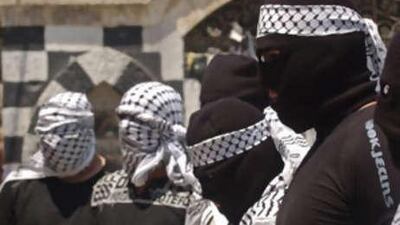RAMALLAH // Just when it seemed Palestinian internal divisions could not get worse, they did just that as Fatah members from Gaza had to flee to Israel to avoid a Hamas military action in the coastal strip. Both sides have blamed each other for the worst Palestinian-Palestinian fighting since Hamas seized control of the Gaza Strip in June 2007, and prospects for reconciliation between the two factions appear more remote than ever.
With much talk and precious little action on national reconciliation efforts since Mahmoud Abbas, the Palestinian president, called for unconditional talks in early June and in spite of Arab mediation attempts, both Fatah and Hamas pursued their independent ways vis-à-vis Israel, the occupying power in overall control of both the West Bank and the Gaza Strip. Hamas secured a ceasefire in and around Gaza that saw an end to Israeli military operations there. The ceasefire has yet to deliver on improving living conditions, however. There has been some increase in the number and kinds of goods allowed into Gaza, but not enough to affect positively on either industry or other sectors; Gazans remain unable to travel to and from the area.
Fatah, meanwhile, under Mr Abbas, continued negotiations with Israel to reach agreement by the end of the year as per the Annapolis process. These talks have yielded no visible result, and Mr Abbas's dogged pursuit of diplomacy has, with every new Israeli announcement of more tenders in settlements in occupied territory, eaten into his credibility among ordinary Palestinians. With Hamas failing economically and Fatah diplomatically, both are struggling to convince a Palestinian public eager for unity but less and less impressed with either of their two main political factions. This stalemate provided the context into which a bomb was literally thrown on July 24, when an explosion near a Gaza beach killed five senior Hamas militants and a child.
Hamas blamed elements in Fatah for the explosion and began rounding up Fatah supporters in Gaza. Incensed, Fatah responded in kind in the West Bank. Matters reached a head on Saturday, when Hamas forces battled Fatah fighters in the Shijaiyah neighbourhood of Gaza City, a stronghold of the Fatah loyalist Helles clan that Hamas considers prime suspects in the July bombing. Ultimately, the fighting claimed the lives of 11 people and left dozens injured.
Some 180 Fatah fighters were granted permission to enter Israel as they fled Hamas forces. Israel then received a request from Mr Abbas to return most of them to Gaza, but Hamas arrested the first batch of 32 before it was decided to send the rest to the West Bank. "Hamas is following a programme to scupper every Palestinian and Arab attempt to hold a national dialogue," said Abdullah Abdullah, a senior Fatah official. "Hamas is not interested in this dialogue. The movement does not accept partners or another voice.
"It was an opportunity for Hamas to cover for the failure of its policies in Gaza, where it cannot meet anyone's needs." Mr Abdullah called the situation that saw Palestinians flee to Israel "absurd" and said the original decision to send them back to Gaza was taken because Fatah did not want to see Palestinians become refugees because of each other. Hamas officials said their actions were legitimate attempts at asserting law and order. "This has mistakenly been portrayed as fighting between Fatah and Hamas," said Ahmed Yousef, a senior Hamas official.
"But this is an investigation into [the July 24] explosion and that investigation led police to this particular neighbourhood. Police have the right to arrest anyone suspected of involvement." Mr Yousef said he regretted the "bloody" fighting that followed, but suggested the Fatah leadership in Ramallah had tried to take advantage of the situation. "People in Ramallah may have tried to exploit the situation and escalate it in the hope that it might lead to a popular uprising against Hamas."
Although both Mr Abdullah and Mr Yousef maintained that national reconciliation remained a priority for both factions, observers are less certain that either party consider serious efforts at unity to be to their advantage at this point. "Ultimately there will have to be rapprochement," said George Giacaman, a Palestinian analyst and head of the Democracy Program at Birzeit University near Ramallah. "But these incidents will defer serious reconciliation negotiations that in any case will not start before the end of Palestinian-Israeli negotiations in the coming few months."
Israeli and US opposition to Hamas's participation in Palestinian governance will leave Mr Abbas unable to pursue serious reconciliation efforts, Mr Giacaman said, while Hamas will feel that it can only gain by waiting since the movement is convinced Palestinian-Israeli negotiations will go nowhere, vindicating the Islamist movement's position. Mr Giacaman also said Hamas was acting to impose its control over Gaza in a way that was never done before. "Whatever one may say about Hamas's behaviour now, the security situation is a result of previous understandings whereby clans and families remained armed.
"This undermined the PA's authority even before Hamas took over, and now Hamas seems intent on eliminating these groups, one by one." @Email:okarmi@thenational.ae

